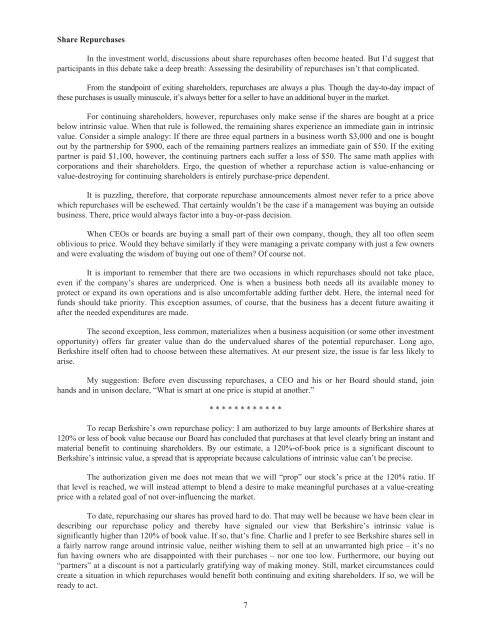Berkshire’s Performance vs the S&P 500 2
gnjtA93
gnjtA93
You also want an ePaper? Increase the reach of your titles
YUMPU automatically turns print PDFs into web optimized ePapers that Google loves.
Share Repurchases<br />
In <strong>the</strong> investment world, discussions about share repurchases often become heated. But I’d suggest that<br />
participants in this debate take a deep breath: Assessing <strong>the</strong> desirability of repurchases isn’t that complicated.<br />
From <strong>the</strong> standpoint of exiting shareholders, repurchases are always a plus. Though <strong>the</strong> day-to-day impact of<br />
<strong>the</strong>se purchases is usually minuscule, it’s always better for a seller to have an additional buyer in <strong>the</strong> market.<br />
For continuing shareholders, however, repurchases only make sense if <strong>the</strong> shares are bought at a price<br />
below intrinsic value. When that rule is followed, <strong>the</strong> remaining shares experience an immediate gain in intrinsic<br />
value. Consider a simple analogy: If <strong>the</strong>re are three equal partners in a business worth $3,000 and one is bought<br />
out by <strong>the</strong> partnership for $900, each of <strong>the</strong> remaining partners realizes an immediate gain of $50. If <strong>the</strong> exiting<br />
partner is paid $1,100, however, <strong>the</strong> continuing partners each suffer a loss of $50. The same math applies with<br />
corporations and <strong>the</strong>ir shareholders. Ergo, <strong>the</strong> question of whe<strong>the</strong>r a repurchase action is value-enhancing or<br />
value-destroying for continuing shareholders is entirely purchase-price dependent.<br />
It is puzzling, <strong>the</strong>refore, that corporate repurchase announcements almost never refer to a price above<br />
which repurchases will be eschewed. That certainly wouldn’t be <strong>the</strong> case if a management was buying an outside<br />
business. There, price would always factor into a buy-or-pass decision.<br />
When CEOs or boards are buying a small part of <strong>the</strong>ir own company, though, <strong>the</strong>y all too often seem<br />
oblivious to price. Would <strong>the</strong>y behave similarly if <strong>the</strong>y were managing a private company with just a few owners<br />
and were evaluating <strong>the</strong> wisdom of buying out one of <strong>the</strong>m? Of course not.<br />
It is important to remember that <strong>the</strong>re are two occasions in which repurchases should not take place,<br />
even if <strong>the</strong> company’s shares are underpriced. One is when a business both needs all its available money to<br />
protect or expand its own operations and is also uncomfortable adding fur<strong>the</strong>r debt. Here, <strong>the</strong> internal need for<br />
funds should take priority. This exception assumes, of course, that <strong>the</strong> business has a decent future awaiting it<br />
after <strong>the</strong> needed expenditures are made.<br />
The second exception, less common, materializes when a business acquisition (or some o<strong>the</strong>r investment<br />
opportunity) offers far greater value than do <strong>the</strong> undervalued shares of <strong>the</strong> potential repurchaser. Long ago,<br />
Berkshire itself often had to choose between <strong>the</strong>se alternatives. At our present size, <strong>the</strong> issue is far less likely to<br />
arise.<br />
My suggestion: Before even discussing repurchases, a CEO and his or her Board should stand, join<br />
hands and in unison declare, “What is smart at one price is stupid at ano<strong>the</strong>r.”<br />
************<br />
To recap <strong>Berkshire’s</strong> own repurchase policy: I am authorized to buy large amounts of Berkshire shares at<br />
120% or less of book value because our Board has concluded that purchases at that level clearly bring an instant and<br />
material benefit to continuing shareholders. By our estimate, a 120%-of-book price is a significant discount to<br />
<strong>Berkshire’s</strong> intrinsic value, a spread that is appropriate because calculations of intrinsic value can’t be precise.<br />
The authorization given me does not mean that we will “prop” our stock’s price at <strong>the</strong> 120% ratio. If<br />
that level is reached, we will instead attempt to blend a desire to make meaningful purchases at a value-creating<br />
price with a related goal of not over-influencing <strong>the</strong> market.<br />
To date, repurchasing our shares has proved hard to do. That may well be because we have been clear in<br />
describing our repurchase policy and <strong>the</strong>reby have signaled our view that <strong>Berkshire’s</strong> intrinsic value is<br />
significantly higher than 120% of book value. If so, that’s fine. Charlie and I prefer to see Berkshire shares sell in<br />
a fairly narrow range around intrinsic value, nei<strong>the</strong>r wishing <strong>the</strong>m to sell at an unwarranted high price – it’s no<br />
fun having owners who are disappointed with <strong>the</strong>ir purchases – nor one too low. Fur<strong>the</strong>rmore, our buying out<br />
“partners” at a discount is not a particularly gratifying way of making money. Still, market circumstances could<br />
create a situation in which repurchases would benefit both continuing and exiting shareholders. If so, we will be<br />
ready to act.<br />
7


